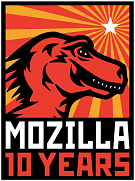 This week I attended Mozilla’s Developer Days at Seneca College, on the York University campus. It had been years since I attended anything at York, and boy has it changed.
This week I attended Mozilla’s Developer Days at Seneca College, on the York University campus. It had been years since I attended anything at York, and boy has it changed.
Our host was Dave Humphrey of Seneca’s School of Computer Studies.
For a free event they sure took good care of us: we had breakfast, lunch and snacks served throughout the day. There was pretty much always something to graze on.
We had access to WiFi. That was kind of flaky; but that’s just par for the course with authenticated WiFi.
Aside form being impressed with the creature comforts provided, I have to give props to the Mozilla organization: they want to get the word out about their technology, and have more people participate in the project; so they get out there and teach! For free! I remember when Borland was trying to raise awareness for Delphi, I was president of the Toronto Delphi User Group, and we had suggested the same thing. Send an instructor around and do some free training. But Borland couldn’t get out of their own way.
Mozilla flew in not just one instructor, but whole teams. Some from as far away as Germany!
Much of the presentations were given by Mark Finkle. He went over all the advantages of XUL:
- Standard technologies we already know: markup, JavaScript, CSS
- Cross-platform: Windows, Mac, Linux, OS/2, Be, settop boxes, mobile, embedded
- Can use binary or script components. Handy for getting down to the metal.
- Built-in accessibility
- Built-in extensibility
- Built-in upgrade
There’s more, of course, but you’ll be able to get it straight from Mark himself: they’ll be uploading video and slides to the wiki.
I also had the pleasure of hearing Steven Lau talk about the Songbird open source media player. Think iTunes, but with plug-ins, and open standards.
We then had Jono demo Ubiquity from Mozilla Labs. Very exciting technology.
There was much more, of course, but I’m hoping it’ll all be in the wiki.
A big thank you to Mozilla for the terrific event.

